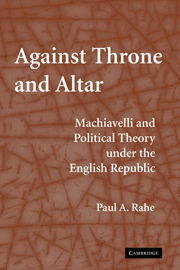Book contents
- Frontmatter
- Contents
- Acknowledgments
- Abbreviations and Brief Titles
- Introduction
- Prologue: Machiavelli in the English Revolution
- PART I MACHIAVELLI'S NEW REPUBLICANISM
- PART II REVOLUTIONARY ARISTOTELIANISM
- PART III MACHIAVELLIAN REPUBLICANISM ANGLICIZED
- PART IV THOMAS HOBBES AND THE NEW REPUBLICANISM
- Epilogue
- Index
PART I - MACHIAVELLI'S NEW REPUBLICANISM
Published online by Cambridge University Press: 21 July 2009
- Frontmatter
- Contents
- Acknowledgments
- Abbreviations and Brief Titles
- Introduction
- Prologue: Machiavelli in the English Revolution
- PART I MACHIAVELLI'S NEW REPUBLICANISM
- PART II REVOLUTIONARY ARISTOTELIANISM
- PART III MACHIAVELLIAN REPUBLICANISM ANGLICIZED
- PART IV THOMAS HOBBES AND THE NEW REPUBLICANISM
- Epilogue
- Index
Summary
Preface
It is by no means fortuitous that, in seventeenth-century England, Machiavellianism was synonymous with evil. After all, Machiavelli's most famous book was designed to shock, and shock it did. To see why, one need only examine the fifteenth chapter of The Prince.
There its author takes up a question first examined by Aristotle in his Nicomachean Ethics and, then, subsequently revisited by Thomas Aquinas in his Summa Theologiœ – “the qualities for which human beings, and princes in particular, are generally praised or condemned.” And just as Aristotle and Thomas, in the course of their discussion of these qualities, had produced a list of eleven moral virtues juxtaposed with their attendant vices, so in this context Machiavelli lists eleven pairs of apparently opposed qualities.
Before doing so, however, Machiavelli insists that his account of the virtues and vices is somehow radically novel: that in his discussion of “the modes and government” proper for dealing “with subjects or with friends” he has departed “from the orders of others.” As he puts it, his intention of writing “a thing useful for one who understands it” renders it “more profitable” for him “to go after the effectual truth of the matter (andare drieto alla verità effettuale della cosa) rather than its image (che alla imaginazione di essa).” The efforts of his “many” predecessors, who “have imagined republics and principalities which have never been seen or known to exist in truth,” he dismisses as worthless.
- Type
- Chapter
- Information
- Against Throne and AltarMachiavelli and Political Theory Under the English Republic, pp. 19 - 21Publisher: Cambridge University PressPrint publication year: 2008



